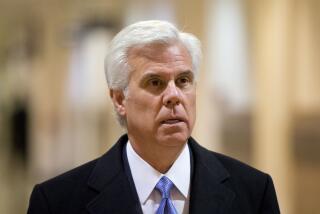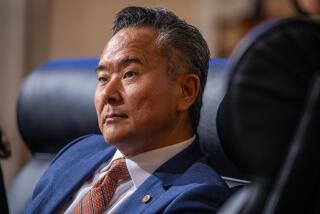Ex-DNC Chief’s Lobbying for Donors Probed
- Share via
WASHINGTON — Senate investigators intend to present evidence today that former Democratic Chairman Donald L. Fowler flouted an internal Democratic National Committee policy when he repeatedly lobbied federal agencies on behalf of major contributors.
The roster of donors represented by Fowler includes Native American tribes, a controversial oil financier and a Southern California businessman who was dismissed by a White House aide as “a hustler.”
Fowler, who is to testify at the Senate hearings on campaign fund-raising abuses, contacted officials in the White House, the Interior Department, the CIA, the Energy Department and a handful of other agencies to assist key contributors, investigators said.
His advocacy, or “selling of influence,” as GOP investigators call it, ran counter to an internal policy prepared by General Counsel Joseph Sandler that forbade “any DNC staff” from “ever contact[ing] an administration official on behalf of a donor for any reason.”
Investigators said that Fowler helped Lebanese American oilman Roger Tamraz attend White House functions after receiving “a very strong warning” from an aide that Tamraz could prove to be an embarrassment to the Democrats.
National Security Council aides had objected to the White House visits by Tamraz, who was pushing an oil pipeline project near the Caspian Sea that administration officials opposed. Critics say that Tamraz used his donations of at least $177,000 to the Democrats to sidestep White House officials who opposed his project and pitch the venture directly to the president.
Fowler also assisted Johnny Chien Chuen Chung, a major donor who ran a fax-machine business in Torrance, in setting up a meeting between former Energy Secretary Hazel O’Leary and a businessman from China, investigators said. A National Security Council aide had described Chung in a 1995 memo as “a hustler” trying to exploit his contacts with the White House.
Chung has alleged that an aide to O’Leary asked him to donate to Africare, O’Leary’s favorite charity, while he was arranging the meeting. Chung contributed $25,000 to Africare on Oct. 19, 1995, the same day O’Leary posed for photographs with the Chinese businessman and others in Chung’s delegation.
In addition, investigators said that they intend to highlight Fowler’s involvement in a pitched battle between tribes in Minnesota and Wisconsin over building a casino.
In 1993, three Wisconsin Chippewa tribes proposed an off-reservation casino at St. Croix Meadows Greyhound Park, a project near the Minnesota border that was bitterly opposed by seven other tribes, most of them based in Minnesota.
*
The opposing tribes had been major Democratic donors, support that Senate investigators said prompted Fowler to contact Deputy White House Chief of Staff Harold M. Ickes and Interior Department officials on the tribes’ behalf.
After Fowler’s intervention, the Interior Department rejected the project in July 1995, overruling Bureau of Indian Affairs officials based in Minneapolis, who had supported the project.
After the decision, supporters of the tribe filed a lawsuit in federal court in Madison, Wis., alleging political interference by a host of top Democratic officials in a decision that should have been based solely on the Indian Gaming Regulatory Act.
U.S. District Judge Barbara Crabb ruled earlier this year that “there is a distinct possibility that improper political interference affected [the] decision.”
In an interview Monday, Interior spokesman Stephanie Hanna denied that politics had tainted the department’s rejection of the project. “The decision was made to turn down this application on the facts,” she said.
Senate investigators, however, say that Fowler championed those tribes that had backed the DNC. At today’s hearing, they will present thank-you letters from the tribes to Fowler.
They will also present the DNC’s own policy forbidding contacts between party fund-raisers and Clinton administration officials. The policy was addressed to “DNC Finance Staff.”
More to Read
Get the L.A. Times Politics newsletter
Deeply reported insights into legislation, politics and policy from Sacramento, Washington and beyond. In your inbox twice per week.
You may occasionally receive promotional content from the Los Angeles Times.










